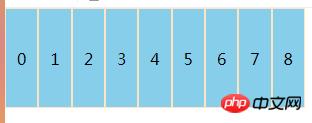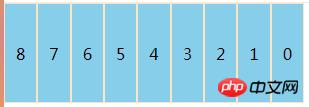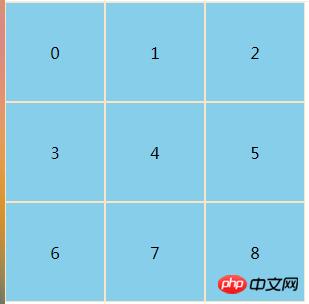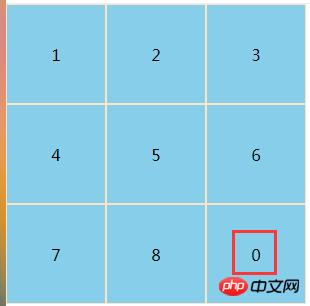css中flex弹性布局的步骤讲解(附代码)
[摘要]本篇文章给大家带来的内容是关于css中flex弹性布局的步骤讲解(附代码),有一定的参考价值,有需要的朋友可以参考一下,希望对你有所帮助。html:<!DOCTYPE html>
<...
本篇文章给大家带来的内容是关于css中flex弹性布局的步骤讲解(附代码),有一定的参考价值,有需要的朋友可以参考一下,希望对你有所帮助。html:
<!DOCTYPE html>
<html>
<head>
<meta charset="utf-8" />
<meta name="viewport" content="width=device-width, initial-scale=1">
<title></title>
<style type="text/css">
*{
margin: 0;
padding: 0;
box-sizing: border-box;
}
.wrap{
width: 300px;
height: 300px;
display: flex;
flex-direction: row; /*默认主轴方向水平向右*/
flex-direction: row-reverse; /*可选主轴方向水平向左*/
/* flex-direction: column; */ /*可选主轴方向垂直向下*/
/* flex-direction: column-reverse; */ /*可选主轴方向垂直向上*/
flex-wrap: wrap; /*默认侧轴方向与主轴垂直方向向下或者右*/
/* flex-wrap: wrap-reverse; */ /*可选侧轴方向与主轴垂直方向向上或者左*/
}
.wrap div{
background: skyblue;
text-align: center;
line-height: 100px;
width: 100px;
height: 100px;
border: bisque 1px solid;
}
</style>
</head>
<body>
<div class='wrap'>
<div"order: 1;">0</div>
<div>1</div>
<div>2</div>
<div>3</div>
<div>4</div>
<div>5</div>
<div>6</div>
<div>7</div>
<div>8</div>
</div>
</body>
</html>步骤一:先给父级容器设置 display: flex;,代表采用 flex 弹性布局
步骤二:设置主轴方向
①flex-direction: row;(默认参数)主轴方向水平向右,结果如图:

②flex-direction: row-reverse;(可选参数)主轴方向水平向左,结果如图:

③flex-direction: column;(可选参数)主轴方向垂直向下,结果自行脑补(主要是太长了/偷笑)
④flex-direction: column-reverse;(可选参数)主轴方向垂直向上,同理
步骤三:设置侧轴方向
①flex-wrap: wrap;默认侧轴方向与主轴垂直方向向下或者右,结果如图:

②flex-wrap: wrap-reverse;可选侧轴方向与主轴垂直方向向上或者左,结果脑补
注意:侧轴的方向是随主轴的变化的,主轴于侧轴总是垂直,两轴的方向默认向右、下
其他属性设置:
flex-flow:<flex-direction> <flex-wrap> 是这两个属性的简写,双参数时是 主轴方向+侧轴方向,两个参数空格隔开;单参数时是主轴方向。
order:number 伸缩项,例如给子容器添加一个order:1,所有子容器的默认order都为0,我们给第一个容器order设置为1时会产生类似于排序的效果

justify-content:flex-start(default) flex-end center space-between space-around 伸缩容器
以上就是css中flex弹性布局的步骤讲解(附代码)的详细内容,更多请关注php中文网其它相关文章!
网站建设是一个广义的术语,涵盖了许多不同的技能和学科中所使用的生产和维护的网站。
……